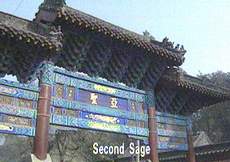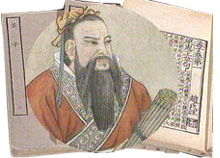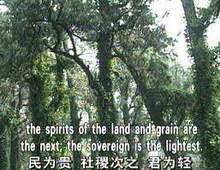 |
|
Mencius |
| CCTV.COM 2002-11-29 10:11:25 |
|
"Neither riches nor honours can corrupt him, neither poverty nor lowly condition can make him swerve from principle, neither threats nor force can bend him." These forceful words represent Mencius' moral standard. Over the past 2,000 years and more, the Chinese have followed these words as a motto.
 Mencius was born in 372 B.C. and died in 289 B.C. at the age of 84. Ke was his personal name. Mencius was another representative of Confucianism after Confucius. He was worshipped as the Second Sage in ancient China. He was an outstanding thinker and educator in the Warring States Period. Mencius was born in 372 B.C. and died in 289 B.C. at the age of 84. Ke was his personal name. Mencius was another representative of Confucianism after Confucius. He was worshipped as the Second Sage in ancient China. He was an outstanding thinker and educator in the Warring States Period.
Mencius was a native of Zoucheng in present-day Shandong Province. His father died when he was three years old. His mother Zhang brought him up. The story of Mencius' mother lecturing her son has been handed down for many centuries.
Mencius' mother spared no pains to move three times in order to find a place where her son could learn and grow up properly. Mencius' mother told her son that learning was something like weaving and it could not be interrupted, otherwise all the previous efforts would be wasted.
Aside from taking students and giving lectures, Mencius began to get in touch with political figures in various states when he was 40. He toured the states to publicize his theory and political views.
 "Benevolent government" was the quintessence of Mencius' political ideas. "Benevolent government" was an inheritance and development of Confucius' "theory of benevolence." "Benevolent government" was the quintessence of Mencius' political ideas. "Benevolent government" was an inheritance and development of Confucius' "theory of benevolence."
Confucius' "benevolence" is an ethical concept with very broad meanings. Its quintessence is to "love all men".
Mencius developed Confucius' "theory of benevolence" into an administrative programme covering the ideological, political, economic and cultural fields. It means "benevolent government". Its quintessence is also deep sympathy and love for the people.
Politically Mencius maintained that "the people are the foundation of a nation".
He said, "The people are the most important element in a nation; the spirits of the land and grain are the next; the sovereign is the lightest." He said that if the sovereign had made mistakes, the subjects could remonstrate with him and if he rejected the remonstrance time and again, he could be overthrown.
Mencius opposed wars of annexation. He held that the wars were too ruthless and the country should be unified by "a benevolent government".
 Economically Mencius maintained that "the people should have immovable property", the farmers should have the proper right to use the land and taxes should be reduced. The theoretical basis of Mencius' "benevolent government" is the view that "man was born with goodness." Economically Mencius maintained that "the people should have immovable property", the farmers should have the proper right to use the land and taxes should be reduced. The theoretical basis of Mencius' "benevolent government" is the view that "man was born with goodness."
Mencius said, "The feeling of commiseration belongs to all men." He held that goodness was a nature unique to mankind and a most important distinction between man and animals. He stressed the need to educate man and the impact made by the environment on man.
Mencius held that man could display a strong enterprising spirit only in adverse circumstances. He believed that man could exist only in sorrow and calamity and seeking ease and pleasure would inevitably lead to extinction.
Mencius valued the cultivation of moral quality. He believed that "righteousness" was more important than life and one could give up his life for the sake of "righteousness".
Mencius' theory produced a far-reaching influence. His idea that "the people are the foundation of a nation" provided a theoretical basis for reformers and revolutionaries in later ages. His moral standard encouraged people with high ideals to struggle courageously for the truth and righteousness.
|
|
Editor: Inner Wu CCTV.com
|
|
|
|
|
|
 |









